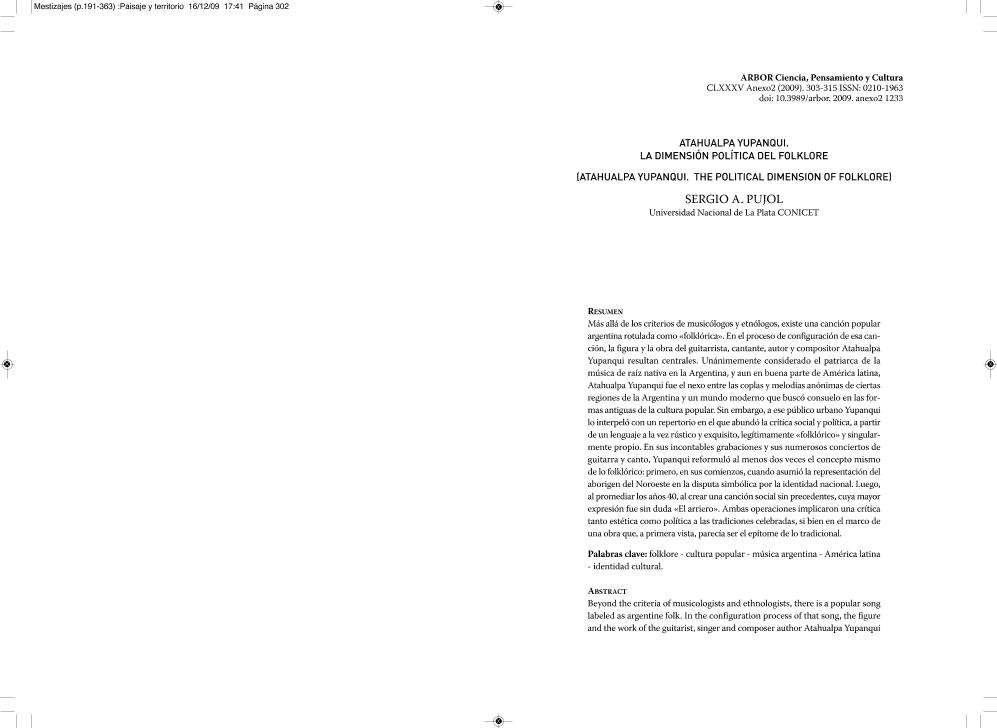Artículo
Más allá de los criterios de musicólogos y etnólogos, existe una canción popular argentina rotulada como «folklórica». En el proceso de configuración de esa canción, la figura y la obra del guitarrista, cantante, autor y compositor Atahualpa Yupanqui resultan centrales. unánimemente considerado el patriarca de la música de raíz nativa en la Argentina, y aun en buena parte de América latina, Atahualpa Yupanqui fue el nexo entre las coplas y melodías anónimas de ciertas regiones de la Argentina y un mundo moderno que buscó consuelo en las formas antiguas de la cultura popular. Sin embargo, a ese público urbano Yupanqui lo interpeló con un repertorio en el que abundó la crítica social y política, a partir de un lenguaje a la vez rústico y exquisito, legítimamente «folklórico» y singularmente propio. En sus incontables grabaciones y sus numerosos conciertos de guitarra y canto, Yupanqui reformuló al menos dos veces el concepto mismo de lo folklórico: primero, en sus comienzos, cuando asumió la representación del aborigen del Noroeste en la disputa simbólica por la identidad nacional. Luego, al promediar los años 40, al crear una canción social sin precedentes, cuya mayor expresión fue sin duda «El arriero». Ambas operaciones implicaron una crítica tanto estética como política a las tradiciones celebradas, si bien en el marco de una obra que, a primera vista, parecía ser el epítome de lo tradicional. Beyond the criteria of musicologists and ethnologists, there is a popular song labeled as argentine folk. In the configuration process of that song, the figure and the work of the guitarist, singer and composer author Atahualpa Yupanqui is central. unanimously, considered the patriarch of the native root music in Argentina, and even in large part of Latin America, Atahualpa Yupanqui was the nexus between the «coplas» and melodies anonymous in certain regions of Argentina and a modern world that looked for comfort in older forms of popular culture. however, Yupanqui interpelated this urban public whit a repertoire in which the social and political criticism abounded, whit a language at the same time rustic and exquisite, legitimately folk and uniquely of his own. In his uncountable recordings and his numerous concerts of guitar and singing, Yupanqui reformulated at least twice the concept of folk: first, in his beginnings, when he took the representation of the northwest aborigine in the symbolic dispute by the national identity. Then, in the 1940s, when he created a social song, whose greatest expression was undoubtedly «El arriero» (The muleteer). Both operations implied an aesthetics and political criticism to traditions, even though when they were in the framework of a production that, at first sight, appeared to be the epitome of tradition.
Atahualpa Yupanqui: La dimensión política del folklore
Título:
Atahualpa Yupanqui: The political dimension of folklore
Fecha de publicación:
06/2009
Editorial:
Consejo Superior de Investigaciones Científicas
Revista:
Arbor
ISSN:
0210-1963
Idioma:
Español
Tipo de recurso:
Artículo publicado
Clasificación temática:
Resumen
Palabras clave:
FOLCLORE
,
MUSICA
,
CULTURA
,
YUPANQUI
Archivos asociados
Licencia
Identificadores
Colecciones
Articulos(CCT - LA PLATA)
Articulos de CTRO.CIENTIFICO TECNOL.CONICET - LA PLATA
Articulos de CTRO.CIENTIFICO TECNOL.CONICET - LA PLATA
Citación
Pujol, Sergio Alejandro; Atahualpa Yupanqui: La dimensión política del folklore; Consejo Superior de Investigaciones Científicas; Arbor; CLXXXV; anexo 2; 6-2009; 303-315
Compartir
Altmétricas




